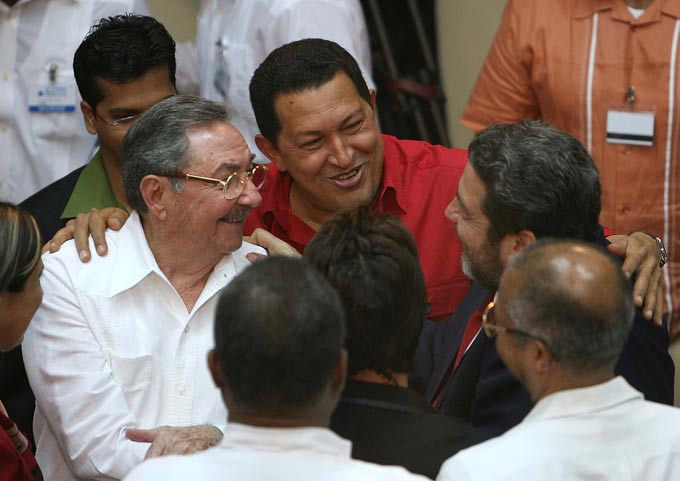In collaboration with Cristian Balteo Yazbeck and Boris Muñoz

Hugo Chávez with Raul Castro (left) and Luiz Inácio Lula da Silva (right), 2009. Photo by Bernardo Londoy.
UPDATED March 6, 2013
The Venezuelan government announced the death of Hugo Chávez on Tuesday, March 5. The late president had traveled to Cuba last December for his fourth cancer surgery, and since that time had remained out of sight. A few carefully choreographed images of Chávez lying in a Havana hospital bed were the only glimpses the Venezuelan people had of their president—who missed his own inauguration for a third term—in almost three months.
The historic leader’s death has pushed the Chavista regime into a state of disarray. Although the country’s constitution calls for new elections, the regime has been postponing the move despite previous attempts by Chavez to placate his supporters back in December, when he requested that they elect his vice president, Nicolas Maduro, in the case of his incapacitation.
Optimistically speaking, Venezuela may in fact be on its way to building a new bipartisan system after more than 20 years of political debacles. But this can only happen if the opposition manages to play an effective counterbalance to the Chavista regime, which has demonstrated its authoritarian stance through a vast array of attacks on democracy and human rights.
Implementing a shift of this nature would likely meet major obstacles. The regime still exerts tight control over all political, judicial, economic and military institutions. Even a moderate shift in its doctrine would not seem to be on the horizon. In preparation for the inevitable presidential elections, the Chavista elite has begun to develop an aggressive strategy of radicalization and polarization. Their recent moves aim to disempower the opposition from making important decisions, diminish their strongest challenger, Henrique Capriles Radonski, and shore up Maduro’s still-weak leadership.
On the international front, the Chavista regime is deeply attached to Cuba through a relationship of political tutelage, in which the Castro brothers allegedly make the decisions that Maduro announces in the name of Chávez. The Caracas regime is furthermore dependent not only on the economic and diplomatic support of China and Brazil, but also on numerous corporations and governments sharing in Venezuela’s unprecedented oil revenues. These parties reap enormous profits by prolonging an untenable situation.
More than two decades of Venezuelan political degradation have resulted in a crisis of criminal violence in which one person is killed every half hour. In order to alleviate this desperate situation, the international community must act. Without applying clear limits and sanctions to authoritarian regimes like Venezuela’s, nations risk succumbing to pragmatic calculations of economic self-interest that render democracy and human rights no more than lofty ideals.
From Creative Time Reports Editors:
In conversation with Alessandro, we came to understand the considerable extent to which government information can diverge from on-the-ground realities in Venezuela. Asserting that “information is a fiction” in his country, the artist explained that he—like any Venezuelan citizen—has had to “navigate between rumors and propaganda.”
While Alessandro and his collaborators have made strenuous efforts to verify and synthesize available accounts of elections, violence and historical events in a transparent manner, the multiplicity of reports they used and interpreted—including data from governmental institutions, universities and news media—presents a challenge to conventions in citation. Hence, Alessandro and his interlocutors, Cristian Balteo Yazbeck (the artist’s brother) and journalist Boris Muñoz, have included many—but not all—of their sources in this document.
This piece opens with a staged conversation among Alessandro, Boris and Cristian, which Alessandro has constructed from several phases of correspondence and discussion, beginning during the presidential campaign leading up to the October 2012 elections. The conversation includes hyperlinks to a chronology of Chávez’s rise to power and a glossary explaining terms that are key in understanding the present situation in Venezuela. We hope you will follow the links back and forth between sections, reading in the non-linear fashion afforded by this format to supplement the speakers’ insights with their significant historical research.

